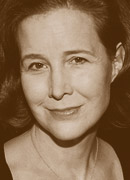
Ann Patchett is a beloved author among Powell's employees. Her 2001 novel
Bel Canto, which won the PEN/Faulkner Award, might be the most popular, but her earlier novels
The Magician's Assistant and
The Patron Saint of Liars also have their fervent fans. Her dazzling and heartbreaking memoir about her friendship with the writer Lucy Grealy,
Truth and Beauty, was frequently recommended to customers and fellow employees. And we love her most recent novel,
State of Wonder, so much that we chose it as our 27th volume of
Indiespensable, Powell's subscription club.
State of Wonder is the remarkable story of Marina Singh, a pharmaceutical scientist in Minnesota, who is sent to the Amazonian jungle to find out what happened to her colleague, whose death occurred under somewhat mysterious circumstances. She's also directed to gather information about the work of Dr. Annick Swenson, a formidable scientist, doctor, and Marina's former teacher who has been studying an Amazonian tribe with unheard-of fertility longevity.
In a starred review, Kirkus calls State of Wonder, "Thrilling, disturbing and moving in equal measures ? even better than Patchett's breakthrough Bel Canto." In another starred review, Publishers Weekly lauds, "[An] out-there adventure, a juggernaut of a trip to the crossroads of science, ethics, and commerce that readers will hate to see end." Page-turningly suspenseful, gorgeously written, full of fascinating characters, and brimming with the beauty and danger of the Amazonian jungle, this latest from a master of the form is not to be missed.
÷ ÷ ÷
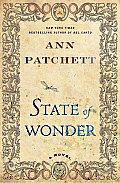 Jill Owens: Which character came first, Marina or Dr. Swenson?
Jill Owens: Which character came first, Marina or Dr. Swenson?
Ann Patchett: It depends on at what point we start to think of them as characters. It's almost like, When does life begin? [Laughter] In the beginning, the book was much more about the situation than a character. It was more based in algebra. I knew that character B goes missing, and character A is sent to find character B, and, a long time ago, character A knew character B. So, it started much more algebraically as opposed to having a vision of Marina.
Then I thought, How did they know each other before they were teacher and student? Why were they teacher and student? Because they were both doctors, I realized. So, Marina and Dr. Swenson really came about at the same time.
One of the more interesting things to me, looking back, is that I couldn't decide if they were going to be two men or two women. I never thought of them being a mix, one of each. But when I had the whole story worked out and their personalities worked out, I kept thinking, As much as I wanted to write this book and have these characters be women, will they have the authority? Will there be as much tension? Will the stakes seem as high if they are both women? Now looking back, I think, How did you even think that! But I did.
Jill: That's surprising because the fact that they are women relates to the plot.
Patchett: Yes, of course. Eventually it does.
Jill: And the fact that they're women lends a particular dynamic to their work on this fertility drug.
Patchett: Right. But I see reviews, or things people have written about the book, that have said, "This is a book about female fertility," and I think, Oh, no, that's not it. That was just me trying to come up with a drug that everyone in the States would want that would be very, very valuable. I ran down the list of something that would grow hair or something that would make you instantly thin or something that would enable you to have children forever. So, it wasn't about that either.
Jill: I thought it was interesting that Marina's first comments to Mr. Fox about the Lakashi's extremely long fertility is that if the Lakashi knew what they were doing to cause it, they'd stop doing it. [Laughter]
Patchett: Right.
Jill: She doesn't have any children, but that's still her immediate response.
Patchett: When I've gone out and given talks in the last year about the book, some people have asked, "Will you tell us what this book is about?" I'll say, "There's this tribe in the Amazon where the women can have children forever." The audience gasps and recoils. Then I laugh and say, "Yes, it's a horror novel." [Laughter]
Jill: It's fascinating that it's that polarizing, because I can completely see that reaction and yet, as you say, that kind of drug would be so desirable. It covers both ends of the spectrum, people being horrified by the idea of it, but other people wanting it desperately.
Patchett: What makes it horrible is the word "forever." And suddenly we're all picturing our grandmothers being pregnant at 85. Hopefully, that is horrifying to everyone. But the book is so much about where you draw the line between what's ethical and what's not ethical. It would probably be nice to have a baby without any particular effort at 45, but do you really want people to have a baby with no effort at 55, or 65, or 75? Where do you put the line down and say, "Somebody ought to really think about this"?
Jill: Are the Lakashi based on any actual tribe?
Patchett: No, they're based on my breakfast cereal.
Jill: Kashi! Right. [Laughter]
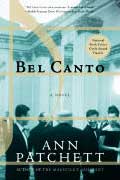 Patchett: No, they're totally made up. One of the things that I really love about writing a novel is that puzzling, sort of like you're working a crossword puzzle or playing a game. I love sitting around and saying, "What would this word be? How would it work? How would we figure out how they would get this stuff into them? Maybe they chew the bark of a tree..."
Patchett: No, they're totally made up. One of the things that I really love about writing a novel is that puzzling, sort of like you're working a crossword puzzle or playing a game. I love sitting around and saying, "What would this word be? How would it work? How would we figure out how they would get this stuff into them? Maybe they chew the bark of a tree..."
My husband's a doctor, and I remember all these conversations. We were in Aspen at one point, on a bus, and the bus driver was talking about Aspen trees. They're called a clone grove; they're all one organism, and the trees are not actually individual trees. It's technically just one tree, one thing popping out of the ground. I was thinking, That's really good. I can use a tree like that that is actually one organism, and it will only exist in this one place, because Aspen trees exist in very few places.
Then it was my husband who said, "What if there was a moth that laid its egg in the bark of the tree, and that somehow combined with this particular bark to promote fertility?"
Jill: What sort of research did you end up doing for the book?
Patchett: I went to the Amazon, which was incredibly helpful and was not incredibly fun. I did not go to Manaus. I was supposed to go to Manaus with Renée Fleming, who had a concert at the opera house. The opera house is at the very beginning of Fitzcarraldo, the Werner Herzog movie.
Jill: I was going to ask about that.
Patchett: I watched the beginning of that movie about 700 times while I was working on this book, to see that opera house. There's also a great documentary called Burden of Dreams, which is about Werner Herzog and the making of Fitzcarraldo. In it, he's just complaining and bitching and moaning about how horrible the jungle is. The camera is on him and he's just standing in front of these trees saying, "This is so awful." I can remember watching that documentary with my computer on my lap and just typing everything he was saying, because it was so great.
Jill: I've been meaning to read Herzog's book Conquest of the Useless, which is about the making of Fitzcarraldo.
Patchett: It's fabulous. That book came out while I was right in the middle of State of Wonder, and I loved it.
Jill: I have no idea, of course, but I bet that Herzog might really like State of Wonder, too.
Patchett: I hope somebody sends it to him. Actually, I know someone who knows him, so I should roll up my sleeves and try to make that happen, just as a means of bowing down ? because I do completely worship him.
Anyway, Renée had a concert in Manaus, and I was thrilled. I thought, This is my dream come true. This is perfect. Then the concert got canceled. Manaus is not supposed to be the garden spot of Brazil. It's really a pit, from everything I've heard. I kept thinking, with my arm wedged behind my back, I should go to Manaus. I should just go by myself for a few days. And I never went. Even after I finished the book, I kept thinking, Go to Manaus. Go. Look at it. But, you've got Google Maps... [Laughter]
Jill: And at that point, since the book's already done...
Patchett: Exactly. I think it's probably close enough. So I didn't go to Manaus. But I did go to the Amazon.
Jill: The way you write about the flora and the fauna in the jungle is gorgeous. So much of it is completely deadly, but it seems like writing about it was a lot of fun.
Patchett: It was, and it was really helpful to go and look at it. The long and the short of it is, if I had gone for 36 hours, it would have been plenty. Unfortunately, I went for about 10 days. Maybe that was long enough for me to have the experience of going out of my mind in the Amazon. But just to get on the river and see it at all is amazing. There were a lot of moments that it reminded me of being out on a river in Tennessee, because Tennessee is such a wildly overgrown, muggy place, with muddy rivers and overhanging trees. It's odd. There were some similarities.
Jill: I heard in another interview that the snake incident in your novel was inspired by something that happened to you on one of those rivers.
Patchett: This thing happened, and months later I was in New York. I was with my friend Patrick Ryan and his boyfriend in a restaurant in the East Village, and I was telling them the story about this snake. They were so ashen and open-mouthed. They pushed their food away, and they were ready to run out of the restaurant as I'm telling this story. So, I thought, Wow, this is good. I should put this in the book, which for some reason, I hadn't thought about doing originally.
We were down in the Amazon, in Peru. Every day the guides would put us into little open boats. There would be 8 or 10 people on the open boats. We would go out for hours and hours, down these tiny, twisting tributaries that fork right, fork left, fork left, fork right. We were all thinking, If the guide has a heart attack, we are screwed because we are never getting out of here. Hours and hours go by and you don't see anybody. It's very remote. That is the point I would like to underscore.
Early on in the trip, we were in a lettuce pond. One of the guys on the boat said, "Stop the boat." This is not a guide. This is a tourist on the boat. He looks in the water and looks in the water. He darts his hand down into the water and he pulls up an anaconda.
He didn't catch it close enough to the head. He caught it maybe 10 or 12 inches below the head. So, it's swinging around with its giant, gaping maw, looking to clamp on his face. This whole thing takes maybe four seconds. The snake is out of the water. He doesn't have a good purchase on it and he drops it back in the water. And we are all screaming passionate invectives about what he should do with the snake! [Laughter] He drops the snake, and it's gone. He says, "Boy, if you don't catch them close enough to the head, it's really a problem."
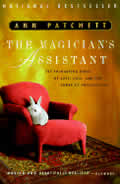 He was the sweetest, most unassuming, lovely guy. No swagger, nothing. The boat goes on and, at this point, we're saying, "Who are you? You're not like the rest of us!" He said, "I've never caught an anaconda in Peru before. That would have been my first one. I've caught six in Brazil." We're like, "What? Who are you? Who are you?" [Laughter]
He was the sweetest, most unassuming, lovely guy. No swagger, nothing. The boat goes on and, at this point, we're saying, "Who are you? You're not like the rest of us!" He said, "I've never caught an anaconda in Peru before. That would have been my first one. I've caught six in Brazil." We're like, "What? Who are you? Who are you?" [Laughter]
It turns out the guy's name is Greg Greer, and he's a professional snake handler and naturalist and tour guide. He travels all over the world with different tour groups. He knew every plant, every bird, every animal in every country on the globe. And he picked them all up.
So, we're going to have lunch. All of this is just insanity. But this is the point of the day when we're going to a ranger station to have a picnic lunch. We get there and eat. There is really an Apocalypse Now moment where we realize that nobody's been in this ranger station in 50 years. Why they thought it was a good idea to put us in an open boat for four hours so we could picnic in this place, I don't know, but we do.
Then we get back in the boat. We're going back downriver, and, sure enough, we pass the same lettuce field. And Greg says, "Pull in there. I'd like to look in the lettuce field again, because I got so distracted last time." We pull in and we get right in the middle of it. He says, "Stop," and I'll be damned if that snake was not in the same place.
It was the same snake, I think I would be accurate in saying. It was the same snake in the exact same spot. That was where the snake lived. This time, the boat stops and Greg gets it right by the head and he pulls that anaconda, which is somewhere between 15 and 18 feet long, into this 10-foot-long open boat. There is no place to go.
I am not afraid of snakes. I mean that. I'm afraid of clowns. [Laughter] If he'd pulled a clown into the open boat I would have gone over the side. Antique porcelain-faced baby dolls, yes, I would have jumped into the water. But a snake, I'm OK. Yet it's so big, and it wraps around him. He's fighting with all he's got to keep its face away from his face. He says, "This is what the snake wants. The snake's purpose is to cover your face with its face."
Everybody's taking pictures and he's giving us a lecture on anacondas. Its mouth is just horrifying. It has no hinges. So, when an anaconda opens its mouth, it's very startling. It has three sets of little teeth going back. I said, "Have you even been bitten by an anaconda?" He replied, "Yes, one got me on the back of the calf once. It's a very painful bite. It's not a deadly bite." He said the guide, the native in the boat had to pry it off with the paddle from the boat because they didn't want to kill it. It took them forever. I guess it's like being bitten by a pit bull. You just have to work it back and forth and back and forth to try to pry its mouth open. I'm just thinking, "Cut the damn thing's head off."
Well, Greg proved to be an incredible friend and was there for me at every turn in writing this book. When I first wrote that scene, I had Marina cut up the snake with a scalpel, because there was a medical kit on the boat. And so she digs through and finds a scalpel and chops the snake up. I thought that would be very doctor-like.
I called Greg after I had written it, and he said, "No." He said, "That would be like trying to cut through all of the tires in your car with a scalpel. The scalpel would cut for about 30 seconds, and then it would be over." He said, "You will never be in a boat anywhere on the Amazon that doesn't have a machete in it. So, this boat your character's on has a machete, and your only chance is to cut through both of the coils at once, because it will dull the knife so much if you sliced through it one coil at a time." I thought, Oh, this is so good, this is so valuable.
I really dislike acknowledgement pages in novels, and I don't do them. But if I did, in this book, it would have said, "Greg Greer, thank you so much."
Jill: Did he put the snake back in the water after he gave you the lecture?
Patchett: He did, yes.
It smelled like nothing in this world. I'm a girl who grew up in the country, and I know what it's like to run into a skunk and all of that. But it was a foul, putrid, oily stench that just got into your hair, and it was everywhere. Because that snake was really mad. Who knew that a snake had that capacity to stink?
Jill: I had no idea.
Patchett: Yeah, this is how we learn. [Laughter]
Jill: A very dramatic example of how we learn.
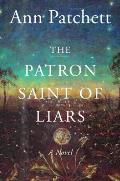 Patchett: You go on those trips and you think, I have no idea what's going to happen, I have no idea if I'm going to learn anything. I remember when we got to the lodge, we ate in this giant grass-roofed area. It had a big wooden deck floor and poles and a giant grass roof, and it was open, and that's where you ate your meals. The guy who owned the lodge said that the night before, two poisonous snakes had been having sex on the roof, and had fallen through and hit somebody's dinner table. [Laughter]
Patchett: You go on those trips and you think, I have no idea what's going to happen, I have no idea if I'm going to learn anything. I remember when we got to the lodge, we ate in this giant grass-roofed area. It had a big wooden deck floor and poles and a giant grass roof, and it was open, and that's where you ate your meals. The guy who owned the lodge said that the night before, two poisonous snakes had been having sex on the roof, and had fallen through and hit somebody's dinner table. [Laughter]
Jill: Just... wow.
Patchett: Wow, what fun, you know? I want to vacation here every year! [Laughter]
It really was just one story after the next of things that could kill you. A tiny poisonous frog, for example. And I remember one day my husband and I were out taking a walk with a guide in the jungle, which is so harrowing. At one point, he started to whisper, "Now we're going to go very, very quietly, very, very quietly. We're not going to say anything. We're going to go around that tree. We're not going to break any branches, because those are killer bees." [Laughter] "And if they hear us, it will be very bad."
I, of course, am remembering every Road Runner cartoon where the bees get mad, and they form an arrow and go after you. It seemed like that was exactly what was going to happen.
Jill: I think you have successfully convinced me that I never want to go to this part of the Amazon.
Patchett: Well, it is very beautiful, and the air is astonishing. They call it the "lung of the world," and you really do understand that oxygen comes from plants. The oxygen saturation level in the Amazon has got to be so far beyond any place else in the world. There are plenty of things to be fascinated by.
Jill: The way you describe the stars is lovely, too. When they shut the lights out on the boat, because of the bugs, and Marina looks up and sees the stars like she's never seen them before, that sounds amazing.
Patchett: Yes.
Jill: That does sound more appealing than killer bees. [Laughter] I'm not afraid of snakes, either, but I am a little afraid of bees.
Patchett: Believe me, there is something there for everyone to be afraid of.
Jill: In the Powell's interview that you did with Dave about 10 years ago, you were talking about how you frequently put several characters into an enclosed area and see what happens. The Vice President's house in Bel Canto, for example, or St. Elizabeth's in The Patron Saint of Liars.
Patchett: Right.
Jill: I was thinking, with this book, you've managed to do that while your characters are actually outside.
Patchett: It's the exact same thing, absolutely.
Jill: You've hemmed them in with the jungle, and the poisonous snakes...
Patchett: And the canopy of trees as the roof. It's all the same book; it's always the same book.
The thing that really made me nuts in the Amazon is that you can't go anywhere by yourself. You can't take the shortest little stroll alone. You have to be with the group all the time, because otherwise something is going to eat you. I've never felt so claustrophobic, and hemmed in, as I did in the Amazon. So, it's the Patchett motif going strong.
Jill: I was also thinking how Marina felt like an outsider in Minnesota, in part because she's half Indian. She eventually comes to feel so at home there in the Amazon.
Patchett: Yes.
Jill: Re-reading your other books, it seems like that might be a theme of yours, too: people finding out their true natures, or their homes, somewhere in incredibly unlikely places.
Patchett: Yes, I think that's very true. They're also discovering their family, their society, their allegiance. You're taken out of what you know, and it seems unbearable, but then in fact it's quite good. Where does that come from? I don't know. [Laughter]
Jill: I was wondering if it happened to you, as well, because in Truth and Beauty it sounded like you weren't really planning on staying in Tennessee but then sort of ended up staying there anyway.
Patchett: I think if I was going to go into therapy ? and this might be a good place to start ? it probably has to do with the fact that my parents were divorced when I was very young, and my mother remarried. I found myself in a different family, in a different state, in a different school. It seemed very awful, but in fact it wasn't very awful. So, that notion of family being what you make of it is something that's always really stuck with me. Or not what you make of it, but what you make it.
I've always been one of those people, and I think everybody is, in a way. Every high-school girl is, although with me it stuck. I have a family-level sense of loyalty and allegiance to the people that I love and I'm close to. Also, every high-school girl says, "My best friend is my sister." But for me that was really true, and still is true. So, I think those things that are my emotional core keep cropping up in my books over time.
Jill: Speaking of therapy...
Patchett: Yes? [Laughter]
Jill: ...Perhaps we can talk about dreams. Marina's Larium dreams are a big part of this book. But dreams are in a lot of your work, I realized as I reread.
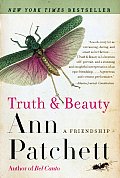 Patchett: The only person who reads my work while I'm working on it is Elizabeth McCracken. Now Elizabeth, very happily, has two small children, so she does it a whole lot less often. She read State of Wonder when I was about halfway through, and then read it when I was finished, as opposed to, say, my sending her a chapter as I wrote it, which was the way we operated when we were young.
Patchett: The only person who reads my work while I'm working on it is Elizabeth McCracken. Now Elizabeth, very happily, has two small children, so she does it a whole lot less often. She read State of Wonder when I was about halfway through, and then read it when I was finished, as opposed to, say, my sending her a chapter as I wrote it, which was the way we operated when we were young.
The one thing that she said that was so helpful (and made me so glad that I sent the book to her when I was halfway through) was, "Enough with the dreams already. Enough with the sage advice from the dead people." Because, when I was first writing this book, the dreams were like a third of the book. Everything that happened, Marina would then discuss with her dead father, and he would give wise council, and they were always going back to India in the dreams. And Elizabeth was like, "You know, it might possibly be interesting if it was the first time you'd done it but man, enough." [Laughter]
Jill: That's really funny.
Patchett: I said to her, "Well, I've got to keep enough of it that I can keep the Larium, because the Larium is important." And ultimately, the way the book ends up, the dreams are important. But basically I took all the father's speaking lines out. He just sort of wanders through the landscape for a second, and then wanders out again, compared to what they were.
Jill: How do you think about dreaming in general?
Patchett: As far as my dream life is concerned, it has been a huge part of my life. But if I could find a pill that would free me from dreams, I would be the first one to take it. Maybe that's what I should have had them inventing in the book. That would be really great.
I had terrible nightmares throughout my youth and early adulthood, until I was about 30, and I was a sleepwalker. Then I stopped. I very rarely have bad dreams now, and I don't sleepwalk at all. But I have unbelievably boring dreams. [Laughter] I'm someone who dreams from the second I close my eyes until the second I open them. A good day or a bad day is really about how much running around I did in my dreams. And 98 percent of my dream life is: I'm packing, and I'm late for a flight, and I missed the subway, and I have to pull my suitcases back up the stairs and take the train to get to the bus. I get on the plane, but there isn't a seat, and I don't have my bags, and I didn't bring my tickets. I went through security, and I forgot my shoes. This is it. All night long, 365 nights a year, this is what I dream.
I have little, bright moments where I see my grandmother or I see Lucy [Grealy]. And I really have very wonderful, loving dreams about my dead people that really are a great gift. I think it's a great gift of my brain, that is. I don't wake up thinking, Oh, this is a visitation from my dead people.
Jill: Right.
Patchett: But it's beautiful and comforting and I'm very, very, very grateful to have that. Still, would I give up those dreams, if I could give up the packing dreams? Yes, I would. I would throw them all out.
Jill: Do you ever know that you're dreaming in the packing dreams? If you did then, maybe you could just... stop packing.
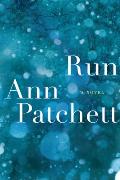 Patchett: Not in those. I've definitely had reoccurring dreams like the awful "I'm back in high school and I have to take Calculus" or "I didn't take French II" or whatever, and I'm 47 and wearing the little uniform, and then I realize I haven't been going to the class and I'm going to fail again. I really did make myself stop having those just by telling myself over and over again, "It doesn't matter. It doesn't matter if I didn't graduate from high school. They're not going to renege my degrees. And I don't really care anyway at this point. You want to take away my college degree? You want my MFA back? It's OK. You can have it. It was not so helpful." [Laughter]
Patchett: Not in those. I've definitely had reoccurring dreams like the awful "I'm back in high school and I have to take Calculus" or "I didn't take French II" or whatever, and I'm 47 and wearing the little uniform, and then I realize I haven't been going to the class and I'm going to fail again. I really did make myself stop having those just by telling myself over and over again, "It doesn't matter. It doesn't matter if I didn't graduate from high school. They're not going to renege my degrees. And I don't really care anyway at this point. You want to take away my college degree? You want my MFA back? It's OK. You can have it. It was not so helpful." [Laughter]
In that way I have managed to get rid of some of them. But I haven't figured out a way to get rid of all of them. I remember, one of my dear, childhood friends ? this was 20 years ago ? was taking a dream workshop and she said, "You get up and as soon as you wake up in the morning you just roll over and write down everything you remember and you train yourself to remember your dreams."
Then she went to a discussion group once a week and they discussed their dreams. I did that for about a week and I thought, "Oh, this is hell on earth." To train yourself to more vividly remember your dreams. No, thank you.
Jill: Friends have suggested that to me, because I do dream pretty vividly most nights, but it takes forever. It was taking this huge chunk out of my morning to write down everything, so I stopped. [Laughter]
Patchett: They do go pretty fast. I remember them very vividly, even for half an hour or an hour, but then by the afternoon I can't put my finger on what it was I dreamed the night before. Sleep is just such an interesting part of the whole picture.
Every now and then, maybe once a year, I'll have a dream that my husband leaves me. He'll say, "I've met someone else, and I don't love you," and there's no discussion, and it's over ? there's just nothing. It's just like, "There's nothing I can do," and I wake up sobbing. That's the saddest. I really love my husband. It's just the saddest, saddest thing. Once or twice a year my husband will have that dream. Then you're angry and hurt, and you bring all of that emotion into your day. Or, if you have a really happy dream, then you can wake up singing.
But I don't like being whipped around while I sleep by something that I can't really put my finger on. [Laughter] If you ever hear of a pill, let me know.
Jill: I will say that, although a lot of people say melatonin makes them dream more vividly, it has the opposite effect on me. It dampens down my dreams a lot.
Patchett: That's interesting. I've never taken melatonin, and I have a bottle of it. But again, because I live in the Valley of the Dolls, being married to a doctor, I could take anything I want. [Laughter] Melatonin seems like child's play, absolute beginners. But I've thought about that before. For the most part, my problem isn't sleeping. Usually, I hardly ever take a sleeping pill. Maybe if I'm traveling. But I haven't tried melatonin.
One of the reasons why I was so interested in Larium is that it is the drug of dreams and people have horrible nightmares on Larium and all sorts of suicidal fantasies and terrible psychiatric problems.
I had a very weird and, supposedly, rare reaction to the Larium. It didn't affect my dream life at all. My dreams were equally boring. But it burned out the inside of my mouth and my throat and my tongue, in the same way that, if you eat really hot soup or take a sip of coffee, it will burn off the top of your tongue. It did that for my entire mouth and throat.
Jill: That's horrible.
Patchett: It wasn't that bad ? in the same way that if you burn your mouth really badly, it's painful for a second, but then it's just weird. You can't really taste anything, and it's mildly uncomfortable but not terrible. But that's what happened, everything peeled off and was gone, and I couldn't taste anything the whole time I was in the Amazon, which wasn't really a problem because the food wasn't particularly good. It's called Stevens-Johnson syndrome.
I told the doctor who gave me the Larium about it when I saw her at a party after we got back. My husband said, "Oh, and Ann had Stevens-Johnson syndrome." She said, "No, she did not. You're exaggerating. Nobody gets that." We told her that I really did, and she said, "Don't ever take Larium again because if this is what happened this time, something much worse will happen to you the next time you take it."
Jill: Everything associated with this trip to the Amazon was just fraught with extreme danger. I'm impressed that you made it back. [Laughter]
How did you think about pace for this book? I noticed, as I was putting together questions, that I took tons of notes up until a certain point, and then the book became so page-turning that I couldn't put it down in order to continue to take more notes.
Patchett: Did you stop taking notes at the point at which they got on the boat?
Jill: Yes, exactly.
Patchett: I like a page turner. That's the kind of book that I want to write. I am very aware of chapter shape. I like to write a book in which a reader who's in bed says to herself, "I'm going to turn the light off when I get to the end of this chapter." But there's a hook at the end and she thinks, "No, no. I've just got to read two or three more pages into the next chapter."
I love that idea. When somebody says to me, "It was a really good book. It was really literary, but it was also like a thriller," that's what I want to write. It's not necessarily what I always want to read, but I'm a very plot-based writer. Plot is my strength. I like to throw 300 balls up in the air and catch them all at the end. I like a story. I like all the pieces fitting together in some way. That's what I do. That's my trick.
When I wrote this book, I knew that the pace really would pick up once they got on the river. But I also knew that everything that came before needed to come before. Yet I didn't want it to be lesser. But I really struggled with that. Liz Gilbert read it for me when I was finished, and she said, "Everything that happens up to getting on the boat is good, and every single piece of it needs to happen. It just needs to be 75 pages shorter."
She said, "You don't need to take out scenes, or chapters, but you need to take out words. Just go in and shave 75 pages out of the beginning of the book a word at a time, two words at a time." I did that. I really took her seriously. I completely got it. I just went back with a little fine toothed comb and pulled out a sentence, a word, just trying to make everything tighter up to the point where they get on the river.
Jill: I think it worked wonderfully. It absolutely feels like that, that you do need everything that's in there up until that point, in order for the rest of it to be so seamless. I enjoyed that first part equally because it's building the characters and their relationships and setting the scene and the tone of the Amazon. And I loved the characters of the Bovenders.
Patchett: The Bovenders are a great story. You want to hear the Bovender story?
Jill: Of course.
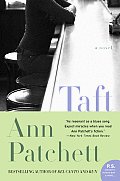 Patchett: Every year our public library has a big gala. They bring in a big-name author, and they have a bunch of festivities and a black-tie event. This is how we do our big fundraising. I'm on the board. And one year, just as I was beginning this book, I gave to the silent auction the right to have a character named for you. It might be a main character and it might be a gas-station attendant with one line. I would make no promises. But if you wanted your name in my book, I would do it.
Patchett: Every year our public library has a big gala. They bring in a big-name author, and they have a bunch of festivities and a black-tie event. This is how we do our big fundraising. I'm on the board. And one year, just as I was beginning this book, I gave to the silent auction the right to have a character named for you. It might be a main character and it might be a gas-station attendant with one line. I would make no promises. But if you wanted your name in my book, I would do it.
People have asked me to do this for years, and I've always said no. But I'm on the board and I want to support my library. I love my library.
So, I'm going to do this. There's a big, fancy patrons' party the night before. The author this year is John Irving. He's being interviewed on stage. At the end of the evening, the director of the library foundation gets up and says, "I'm going to go over the silent auction items. This dinner, this trip, etc. And Ann Patchett said you can have a character named after you in her new book."
John Irving leaps up. I'm in the audience. He says, "Don't do it. Ann, Ann, this is the biggest mistake you'll ever make. I did this once and some very good friends of mine bought it. They bought it for their daughter. She was a lovely young girl. I named a character after her and the character was horrible. She was evil. She was sadistic and cruel and slovenly and disgusting. I couldn't help it, and then I couldn't change her name. They never forgave me. You are standing on the threshold of the biggest mistake you're ever going to make."
Jill: Wow.
Patchett: All from the stage. People were laughing, loving it. The people who bought the names were Jack and Barbara Bovender. I had never thought about it until they won the auction. Those are the most beautiful names in the world. Barbara Bovender is the most beautiful name in the world. I'd known them for years, but I just spent weeks walking around the house going, "Barbara Bovender. Mrs. Bovender. Mr. and Mrs. Bovender. The Bovenders. Jack and Barbara Bovender." I completely fell in love with them.
They are short people in their 60s from the South. I basically made them Nicole Kidman and Keith Urban, who also live in Nashville. [Laughter] So, it's funny. Jack and Barbara haven't read the book yet. I'm getting finished copies of the book this week. Every day, I think, God, I hope they're okay with this.
If it hadn't have been for that auction, I don't know that the Bovenders would have been in that book. I hadn't started writing it yet, and I was working on broad outlines. But really, when they won the auction, I stopped and I thought, "Who would I want the Bovenders to be?" Then I started thinking about the beauty of the name, and these beautiful people came out of that. So it turned out to be such a nice thing for me. And hopefully an okay thing for them.
Jill: That's a really great story.
Patchett: Yeah. And then, actually, at one point I called Nicole Kidman, who I know just the tiniest bit. And I was like, "Okay. You're the only Australian that I know. So, can you give me good surfer slang?" She was great and gave me all sorts of stuff.
Now I'm actually touring in Australia, because the publisher said it's so important, the fact that there are Australians in this book. They think it'll be huge in Australia. They just love it when you put an Australian in there. I keep thinking, I can go to Australia and do interviews saying, "Yes, Nicole Kidman told me to call those shorts 'boardies.'" [Laughter]
Jill: Well, that's a smart trick. You've gotten yourself a trip to Australia.
Patchett: Yeah. But actually for every single book they've asked me to tour Australia. And I've always said no. I was like, "God, if I want to go to Australia, thanks, I'll go on my own time." But for this one they really convinced me, because I had put Australians in there, that it was absolutely essential. Though, I will say, I haven't had any phone calls from Nigeria saying, "Well, there's a Nigerian in there. You better come on over."
Jill: I'd never read The Magician's Assistant until last week, but I went to L.A. about a month ago to visit some friends, and we went to the Magic Castle.
Patchett: Oh my God.
Jill: Which I'd never been to before. So, getting to read the book, having just been there and just seen it, was very cool. That was such a fun coincidence.
Patchett: It is such a glamorous, ratty, threadbare, fabulous place.
Jill: Yes. All of those things.
Patchett: And all of those old guys, sitting around, drinking martinis in the middle of the day, impressing one another. I hope that it will always exist. And I don't know how safe it is or how safe magic is. I think that Johnny Carson kept that place going for so long. He was the "magic" of the Magic Castle. And yet it's still there, hanging on.
I went there when I was 21, and my father was a cop in L.A. He could get in any place. He took me there, and I was a pretty 21-year-old girl in a pretty dress, and I was the assistant. They called me up. That was it. That was really it. The whole book came from that one moment.
I spoke to Ann Patchett by phone on May 12, 2011.